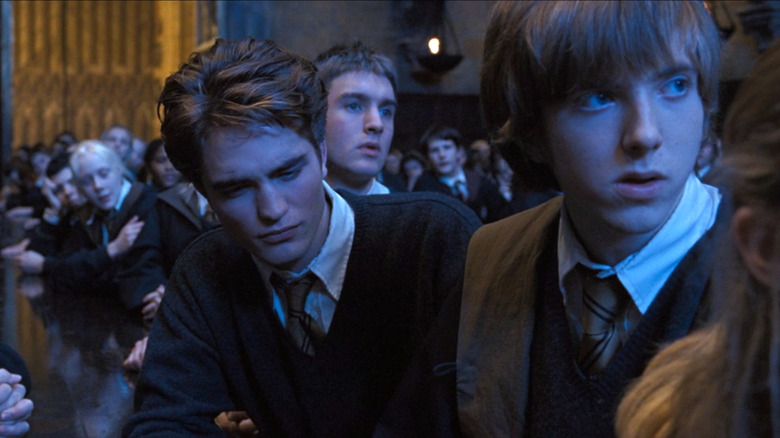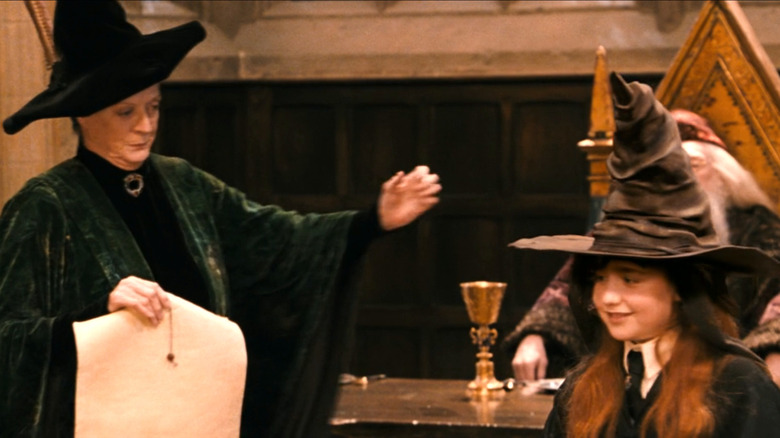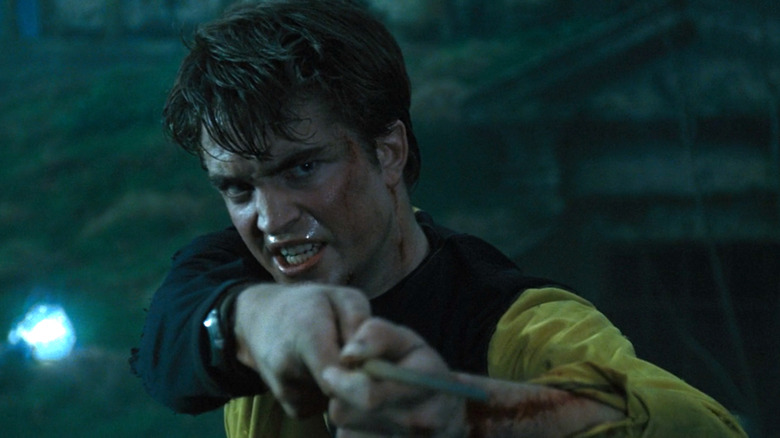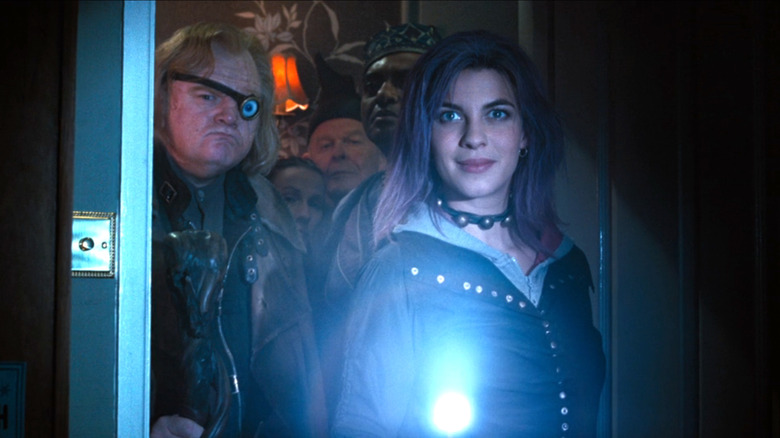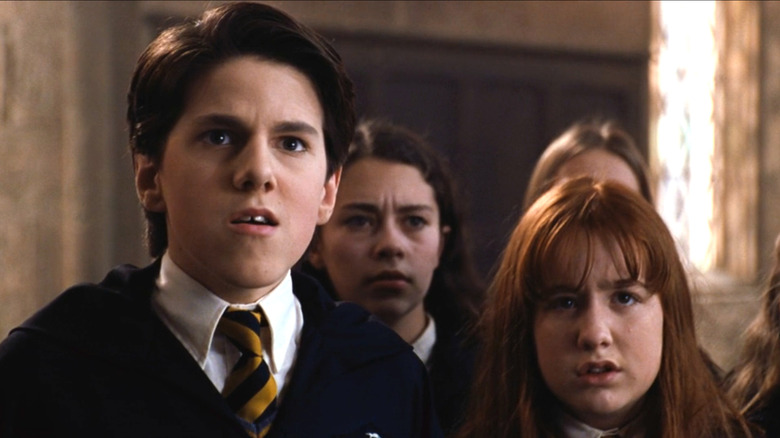Harry Potter's Hufflepuff Traits Explained
Part of what's made the "Harry Potter" franchise such a massive hit is how easily marketable it is. Not only does the Potter brand provide an excuse to sell toy wands and wizard hats to kids everywhere, but the magical school Harry goes to, Hogwarts, is also one that divides its students into four groups, or houses, all of which have their own logo.
Harry Potter himself may have succeeded through the power of friendship and courage, but the "Harry Potter" property succeeded through the power of strong branding. Do you consider yourself a Gryffindor, the house of brave students with a sigil of a lion? Well, there is no shortage of Gryffindor clothing and banners that Warner Bros. would love to sell you. Or perhaps you consider yourself a Slytherin, the house of evil ambitious, cunning students with the sigil of a snake. Or maybe you see yourself as more of a Ravenclaw, the house of brainy students with the sigil of an eagle.
Least popular, and perhaps least marketable, among the Hogwarts houses is poor Hufflepuff, whose sigil is the decidedly-unimpressive badger. Hufflepuffs are charitably described as kind and loyal or uncharitably described as talentless and dull. When people make fun of "Harry Potter," they'll usually sum up the four houses as "the good one, the bad one, the smart one, and the other one." No need to clarify which one Hufflepuff's supposed to be.
Hufflepuff is the house that no one, not even author JK Rowling herself, seemed to put much thought into. But despite all of that, Hufflepuff has its fans. In fact, some Potterheads believe the house deserves far more appreciation than it's gotten so far.
What are the common traits of a Hufflepuff student?
Spoilers below for the fourth book, "Harry Potter and the Goblet of Fire."
The specific traits of a Hufflepuff are that they are "just and loyal," at least according to the Sorting Hat in the book "Harry Potter and the Sorcerer's/Philosopher's Stone." They are also "patient," "true," and "unafraid of toil." Throughout the franchise, they're similarly described as being kind, willing to apologize when they've made mistakes, and having a clear sense of honor that prevents them from lying or cheating.
At first glance, most of how the Sorting Hat describes Hufflepuff feels like faint praise. They're the sort of nice things you say about someone when the person has no talents for you to talk about first. This impression is further cemented by Professor McGonagall's description in "Harry Potter and the Chamber of Secrets" of how the houses were founded. According to her, there were four founders of Hogwarts, all of whom named a house after themselves. Salazar Slytherin wanted all the pure-blooded wizards in his house, Godric Gryffindor wanted all the brave kids, Rowena Ravenclaw wanted all the intellectuals, and Helga Hufflepuff wanted, well, anyone who didn't qualify for the first three categories. Basically, the other three houses are defined by what they are, while the Hufflepuff house is defined by what it isn't.
As some fans interpreted it, Hufflepuff wanted the spare students who wouldn't have hacked it in any of the other three houses. This brings an extra painful irony to the events of "Harry Potter and the Goblet of Fire," where the last words Cedric Diggory — the Hufflepuff student who factors heavily into the story – hears before he's murdered are "Kill the spare!" It feels like a fitting (and cruel) fate that the first major death in the "Harry Potter" books involved a Hufflepuff who was killed for the crime of being irrelevant.
Why are Hufflepuffs considered underrated?
But despite how the world sees Hufflepuffs, many fans have learned to appreciate and identify with the house anyway. One major point in their favor is that Cedric Diggory is a well-liked character who easily lives up to all the qualities attributed to his house. When Harry does him a favor at one point, Cedric feels the need to return it. He also refuses to take part in the school-wide bullying of Harry after the Goblet of Fire inexplicably selects him to be the fourth Triwizard champion. Even when Cedric has an opportunity to grab the Triwizard Cup for himself and win the tournament, he insists on sharing the prize with Harry instead.
Perhaps most notably, it's Cedric who's the only seventh-year Hogwarts student the Goblet of Fire deems worthy of being in the Triwizard Tournament. This is easily the biggest PR win for Hufflepuff in all seven "Harry Potter" books. Of the dozens of applicants across all four Hogwarts houses, only a Hufflepuff is chosen, and that Hufflepuff almost ended up winning the whole thing. He would've tied for first with Harry, too, if the malevolent Lord Voldemort hadn't interfered. That counts for something.
The other major point in Hufflepuffs' favor is that they stick around for the Battle of Hogwarts in the final book, "Harry Potter and the Deathly Hallows." Readers knew Slytherins wouldn't bother fighting Voldemort's forces and weren't too surprised when several Ravenclaws snuck away, but I don't think most folks expected the Hufflepuffs' choice. Pretty much all of the Hufflepuffs stick around for the story's big showdown. Their numbers equal the Gryffindors, even though it's only the Gryffindors regularly heralded for their bravery. In one of their last acts before the books end, Hufflepuffs prove their bravery, yet never ask for any credit in the process.
Who are the most prominent Hufflepuffs in the series?
Tragically, for the Hufflepuffs, Cedric remained the most prominent member of his house in the books even after "Goblet of Fire." Indeed, his death loomed over their narrative far more than surviving Hufflepuff students like Ernie MacMillan or Hannah Abbott. Admittedly, though, that changed when the later novels brought in Nymphadora Tonks, a Hufflepuff who is well-liked by the fandom despite barely getting any focus in the books and even less focus in the "Harry Potter" movies. The fact she's a Hufflepuff doesn't feel particularly relevant either, given that she's already left from Hogwarts by the time she shows up, and these house divisions barely seem to matter among the adult characters.
Other prominent Hufflepuff characters include Professor Sprout, the Hogwarts herbology professor who never gets much attention in the franchise either. Sprout is presented as being a good, competent teacher who wreaks none of the havoc that Hogwarts teachers like Severus Snape or Sybill Trelawney constantly do.
Notably, Professor Sprout also has a good relationship with Neville Longbottom, a Gryffindor student who rarely gets good grades but does excel in Sprout's class. This connection between the two characters, combined with the constant accusations from other "Harry Potter" characters that Neville doesn't really belong in Gryffindor, have fueled a lot of fan discussion around whether Neville should've been made a Hufflepuff. The popularity of this theory declined in the fandom as the books went on and Neville evolved into a stronger wizard, but for the first few books Neville served as a Hufflepuff in spirit, if not in any literal sense.
Will Hufflepuffs be given more attention in the upcoming TV show?
Although many are skeptical of the upcoming "Harry Potter" TV show reboot set to stream on HBO Max in 2027, it does have one clear advantage: It will be able to devote more time to world-building. Not only does the series have the chance to do right by all the minor Hufflepuff characters from the original books, but it may even go beyond the books with the attention it's willing to give the house.
To be sure, one great advantage of the medium of TV is that shows can throw in the occasional departure episode, in which the main plot is put on pause to explore the lives of a minor character or two. A clear recent example of this is something like the Bill and Frank episode of "The Last of Us" or the Beard episode of "Ted Lasso." Not all departure episodes are received well by the audience of course (remember that "Stranger Things" season 2 episode everyone hated?), but the "Harry Potter" franchise is one that seems ripe for the format. In fact, the number one complaint fans have about the "Harry Potter" universe is that this massive magical world is only seen from Harry's limited perspective; an occasional stray episode that focuses on the other Hogwarts houses could be welcomed with open arms by a fandom desperate for more non-Gryffindor world-building.
It's also possible the series will make some changes to the characters' houses. Harry will always be a Gryffindor of course, but what if the show takes inspiration from that widespread Neville observation and makes him a Hufflepuff? This would undoubtedly be a controversial choice, but it would also be a quick and easy way to make Hufflepuffs feel like more of a presence in the show early on. Whatever strategy it takes, let's hope the series understands the benefits that come with its medium and uses that extra time to give all the other Hogwarts houses their moment in the spotlight.
